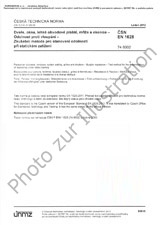Wir benötigen Ihre Einwilligung zur Verwendung der einzelnen Daten, damit Sie unter anderem Informationen zu Ihren Interessen einsehen können. Klicken Sie auf "OK", um Ihre Zustimmung zu erteilen.
ČSN EN 19694-5 (834798)
Stationary source emissions - Determination of greenhouse gas (GHG) emissions in energy-intensive industries - Part 5: Lime industry
Name übersetzen
NORM herausgegeben am 1.1.2017
Informationen über die Norm:
Bezeichnung normen: ČSN EN 19694-5
Zeichen: 834798
Katalog-Nummer: 501040
Ausgabedatum normen: 1.1.2017
SKU: NS-672404
Zahl der Seiten: 64
Gewicht ca.: 192 g (0.42 Pfund)
Land: Tschechische technische Norm
Kategorie: Technische Normen ČSN
Kategorie - ähnliche Normen:
Die Annotation des Normtextes ČSN EN 19694-5 (834798):
This European Standard provides a harmonized methodology for calculating GHG emissions from the lime industry. It includes the manufacture of lime, and any downstream lime products manufactured at the plant, such as ground or hydrated lime. This standard allows for reporting of GHG emissions for various purposes and on different basis, such as plant basis, company basis (by country or by region) or international organization basis.
Since lime is defined as the generic name for quicklime, dolime and sintered dolime, plants manufacturing at least one of these products shall be covered by this standard.
This European Standard addresses all of the following direct and indirect sources of GHG included as defined in ISO 14064-1:
- direct greenhouse gas emissions from greenhouse gas sources that are owned or controlled by the company, such as emissions resulting from the following sources:
- - calcination of carbonates and combustion of organic carbon contained in the kiln stone;
- - combustion of kiln fuels (fossil kiln fuels, alternative fossil fuels, mixed fuels with biogenic carbon content, biomass fuels and bio fuels) related to lime production and/or drying of raw materials;
- - combustion of non-kiln fuels (fossil kiln fuels, mixed fuels with biogenic carbon content, biomass fuels and bio fuels) related to equipment and on-site vehicles, heating/cooling and other on-site uses;
- - combustion of fuels for on-site power generation.
- - indirect greenhouse gas emissions from the generation of imported electricity, heat or steam consumed by the organization;
- - other indirect greenhouse gas emissions, other than energy indirect GHG emissions, which is a consequence of an organization´s activities, but arises from greenhouse gas sources that are owned or controlled by other organizations such as from imported kiln stone.
This European Standard is to be used in conjunction with EN 19694-1, which contains generic, overall requirements, definitions and rules applicable to the determination of GHG emissions for all energy-intensive sectors, provides common methodological issues and defines the details for applying the rules. The application of this standard to the sector-specific standards ensures accuracy, precision and reproducibility of the results and is for this reason a normative reference standard.
Together these standards provide a harmonized method for:
- a) measuring, testing and quantifying methods for GHG emissions;
- b) assessing the level of GHG emissions performance of production processes over time, at production sites;
- c) establishment and provision of reliable, accurate and quality information for reporting and verification purposes.
GHG emissions offset mechanisms, including but not limited to voluntary offset schemes or nationally or internationally recognized offset mechanisms, shall not be used at any point in the GHG assessment according to this standard
Normansicht ČSN EN 19694-5 (834798)
Empfehlungen:
Aktualisierung der technischen Normen
Wollen Sie sich sicher sein, dass Sie nur die gültigen technischen Normen verwenden?
Wir bieten Ihnen eine Lösung, die Ihnen eine Monatsübersicht über die Aktualität der von Ihnen angewandten Normen sicher stellt.
Brauchen Sie mehr Informationen? Sehen Sie sich diese Seite an.




 Cookies
Cookies
